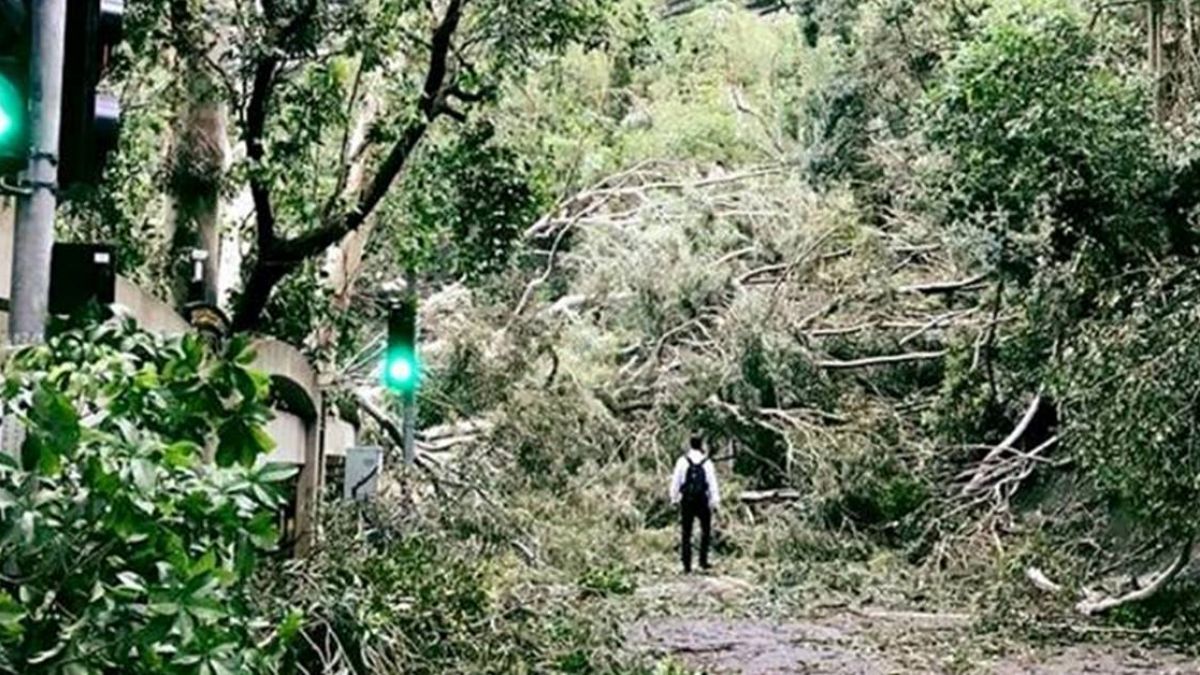God's punishment vs man-made disaster! Why rush back to work within two hours of the eighth wave?
A Lion Rock caused chaos in Hong Kong, and the public scolded the observatory for "popping and popping in". Although the wind and rain were severe, they refused to hoist the typhoon signal No. 8 or black rainstorm warning on Friday, forcing the public to go to work and school as usual . The female worker who collapsed on the scaffold was unfortunately killed, and it was also counted on the head of the observatory. After all, if the observatory is more decisive, if there is a storm and everyone stays indoors, the tragedy may not happen.
On the other hand, people claiming to be familiar with the situation pointed out that the observatory is not the final decision maker of the warning signal. They can only submit scientific data to the government, and the high-level government decides whether to change the warning signal. The monitoring system of the Hong Kong Observatory is already among the best in the world. Unpredictable situations are always in the air, and no one can 100% predict the direction of the weather.
The discussion points focus on when to hang and when to drop. Because it's about the closest economic activity - when will wage earners go back to work.
However, I would like to ask instead,
Who invented the inhumane law of "returning to work within two hours after the warning is removed"?
What does work mean to Hong Kong people?
Hong Kong people are known as the most diligent and efficient wage earners in the world. In the eyes of outsiders, Hong Kong people feel that Hong Kong people love work, are flexible, and prioritize completing tasks, even at the expense of life after get off work. He even often speaks for the boss. Under the epidemic, business is poor, and many companies delay their salary payments. The migrant workers will sympathize with the boss. When the situation is bad, we can tide over the difficulties together.
To put it bluntly, three words:
servile
People who really love their work, I think are only a few. Most wage earners think that salary is "compensation", compensation is to themselves who have paid for labor and time, and salary is the price of freedom.
"Compensation" not only pays for working hours, but also pays for the world's most expensive rent, transportation, meals, insurance, medical care and other basic living expenses. Because Hong Kong's social security is only sufficient for people to maintain low living conditions and cannot maintain dignity, we desperately need this "compensation" to pay for the high social punishment mechanism under the weak welfare system.
Yes, high property prices, high rents and high living costs are the punishment of the entire extreme capitalist system to the people. In order to satisfy the punishment of others, we have chosen another way of abusing ourselves - hard work and no complaints.
A two-hour return to work in extreme weather is the best proof.
Return to work within two hours

In 2018, when the super typhoon Mangkhut hit Hong Kong, the photos of Hong Kong people rushing back to work have become a global story. Collapsed buildings, fallen trees, fires, and car accidents probably won't stop Hong Kong people from returning to work and school.
Documents from the Observatory and the Labour Department set out:
Generally, the Observatory will issue an early warning ("No. 8 Warning") within two hours before Typhoon Warning No. 8, so that employers have ample time to let employees off work in batches in advance according to the actual situation of the industry/organization to ensure their safety and safety. Alleviate traffic congestion.
Therefore, it has become the consensus of Hong Kong people to return to work "two hours" after the police signal is removed. Companies generally set rules based on the "two-hour" principle. If you are unable to return to the company within two hours, such as 2:05, it will be regarded as an employee late. Employers are entitled to deductions from wages or vacations for employees who are late. This is punishment.
This rule ignores traffic distances and road conditions after extreme weather. The typhoon has just passed and the rainstorm has receded a little. No one knows how the road conditions are. It may be that a tree has collapsed to block traffic, and an accident on the MTR cable may delay work. What if there is a tree in front of the house, it is crumbling, and there is an accident?
Not saying, just asking you to go back to work.
Is it inflexible? Yes, but not covered by law. After Mangkhut, the two hours recommended in the original "Code of Practice under Typhoon or Rainstorm Warning" has been changed to an agreement between employers and employees.
Employers and employees should formulate in advance a set of work/resumption arrangements during the effective period and after cancellation of the "extreme circumstances". When implementing the arrangement, employers should consider the actual situation and consider the different situations of employees, and make flexible handling. ...the safety of employees shall be the primary consideration.
What does it mean? You dismantle the canal yourself, don't bother me.
The reality is that after the epidemic, many companies directly asked employees to "work from home" when the black rain and the No. 8 turmoil took effect. In the old days, "the wind is equal to a vacation", but now "the wind is equal to Home office".
This arrangement of wage earners actually accepted.
Impersonal imbalance mechanism
Working from home unless you live alone, or have your own workplace, it's hard to really practice in extreme weather. Excluding computer systems, company documents, etc., when a wage earner stays at home because of extreme weather, it means that his children and the elderly will stay at home. The first priority should be to take care of them!
Furthermore, the hours and measurements of work from home are not guaranteed by any labour legislation. Who can measure how much "service" employees should provide in extreme weather? All of these should be discussed in detail by the government and the guild, but everyone just thinks they can't see it...
Because a wage earner is just a tool.
Why can extreme weather require employees to go to work regardless of the surrounding environment? Why has the discussion of maximum working hours gone nowhere for nearly two decades? Why is the guild weak? Why do employees defend their bosses?
This is because Hong Kong society does not regard wage earners as "human beings", and wage earners are just working machines. People have emotions and states, which are affected by the objective environment. However, Hong Kong wage earners are required to complete their tasks regardless of the actual or objective circumstances. If the task can't be completed, then, change another one, anyway, there is no shortage of machines.
This kind of mentality and thinking is not only the boss, but also the wage earner. I am just a screwdriver at work, so I can go to another company to do another screwdriver. There is no need to fight and discuss for the overall environment.
Politicians under the banner of labor welfare are at best wage earners in another costume. Therefore, there are very few people who are willing to fight for a real in-depth discussion.
Therefore, depending on individual circumstances, discuss the details of actions that may be implemented in other countries. When Hong Kong people hear that they need to negotiate on their own, the first reaction is, "Is it right?" Then, "It's not fair." We require a policy and system that suits everyone's situation. Otherwise, one party will say, even if it doesn't suffer. Not fair.
For example, the MTR owns bus and rail systems. Under Typhoon Signal No. 8, MTR buses were suspended and railways maintained limited services.
If it is negotiated by the employees, it is reasonable and reasonable, and the railway employees will say, it is not fair, why can the bus stop? we want to work? unfair. The solution might be to double to triple the salary of the employees who are going to work.
If the regulations are determined by superiors or policy, it is much simpler! This is an order, do you do it or not?
Most of the staff will be silent.
The same is true at the level of society at large. It is unwise to act in unison according to what the government says and what the observatory says, but you don't have to be responsible: You tell me to do this, I will do it!
Face it with humor, don't have to change
Let's just believe that the final decision on warning signals rests with the top government, not the observatory. Therefore, the original intention of the design of this system is probably to make the final decision by taking into account the needs of the public at the top of the government, blending science and human nature.
However, if policy makers only consider factors other than "people", this mechanism will become a nuisance measure.
In recent years, Hong Kong people have ridiculed that the Observatory is under the Bureau of Commerce and Economics. Senior officials consider the factors of suspension of work and school, completely divorced from the actual conditions of the public, and only consider money-related operations such as the stock market and property market. Therefore, it is absolutely impossible to hang the No. 8 typhoon signal from Monday to Friday, and it does not matter on Saturday and Sunday! He even joked that with Li's power wall, when Li Sheng wants to make money, the typhoon will never hit Hong Kong.

I don't know if it's a coincidence or if it really happened, but in the past ten years, it's true that there are very few winds on weekdays. Usually the second half of Friday is an early warning, the number 3 on Saturday, the 8th on Sunday, and all signals are lifted before 6:00 on Monday. And it's absolutely fine on weekdays, but it's bound to rain on weekends.
Because we know that it is difficult to change the system, only ridicule and humor can ease the helplessness. In a future where the balance between institutions, science, and governance is broken, do we continue to maintain this attitude, seeking to live without improvement but with minimal punishment? Maybe this is the karma we should endure.
Like my work? Don't forget to support and clap, let me know that you are with me on the road of creation. Keep this enthusiasm together!
